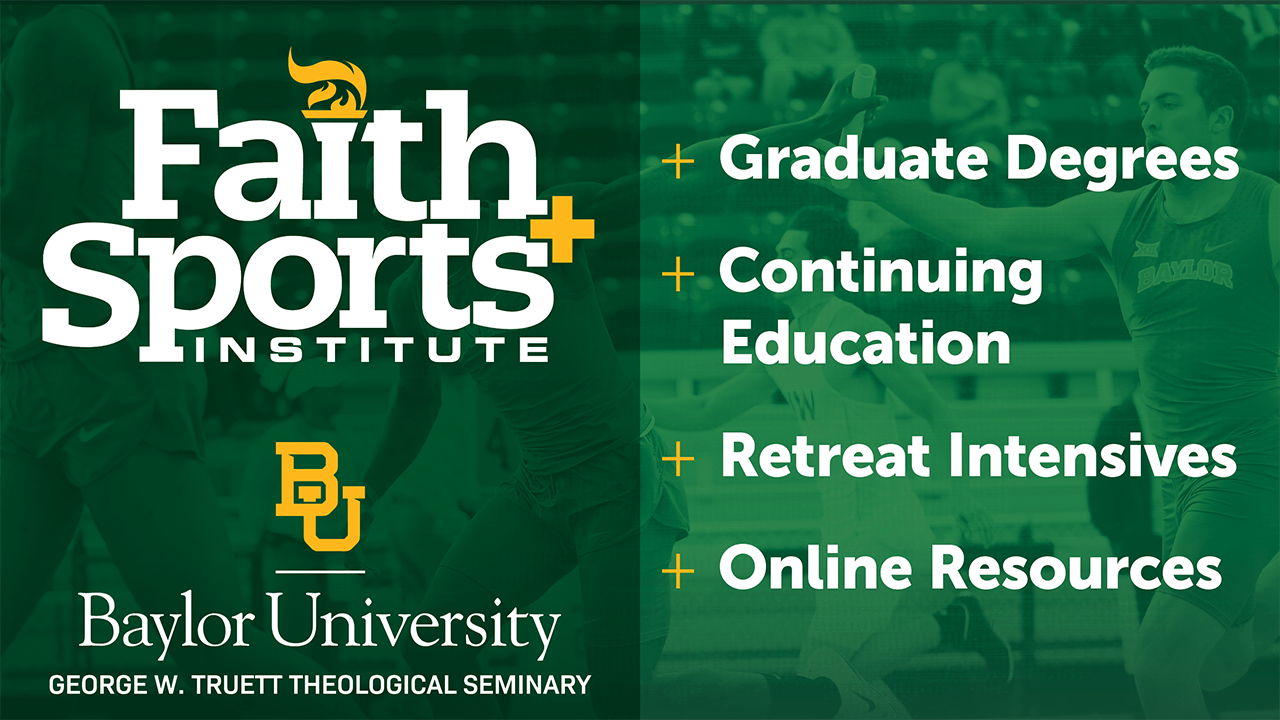Editor’s note: This guest post from from Sean Strehlow, a doctoral student in higher education at Baylor University.
Sean Strehlow
As a society that values sport as a vehicle for character development, we tend to bestow coaches with a significant amount of moral authority. As a former athlete this logic was engrained in me: sports teach you a little something about life and coaches teach you a little something about sports. In my doctoral research I’ve been trying to dig deeper into this logic, especially the way Christian coaches define and think about character. If our society has given coaches some sense of moral authority, in what ways do Christian coaches use it? Asking coaches for their definition of character is a starting point, but their initial definitions tend to be brief and somewhat vague (e.g. character is who you are). The really interesting stuff comes when coaches talk about the specific virtues they try to cultivate. These virtues reveal the type of life—the vision of the “good”— that coaches are seeking to form through sports.
As Christians, if we are going to teach “life lessons” through sport, we must first seriously ask and answer the questions “What type of life?” and “Does this life align with the type of life Christ commends?” The virtues that we emphasize and cultivate in our athletes will reveal our answers to those questions. I’m still in the beginning stages of my research into this topic, but I’m far enough along to notice some general patterns. And as I’ve organized the traits that coaches highlight when they talk about character, I’ve found that they seem to fit into four broad categories.
Athletic Virtues
First, there are athletic virtues that are only intelligible in the context of an athletic competition. Coaches have referred to a “win at all costs” mentality, a “killer instinct,” or even a confidence that borders on arrogance. Most commonly, coaches mention a certain level of aggression that they want to see in their athletes. I wouldn’t argue against fostering some of these qualities in a way that honors the moral ethos of a competition, but I think it is important to be aware of how, if taken out of that context, such qualities can negatively shape the athlete’s character. What place should we give to these athletic virtues? Are they prioritized in our communications with athletes? How can we be intentional about limiting these qualities to a competition? These are all questions that coaches should continually wrestle with.
Performance Virtues
Next, coaches refer to a variety of virtues that foster success in performance-based roles, which are often called performance virtues. Work-ethic, discipline, teamwork, and responsibility are all examples that are highly emphasized in our sports. Notice that, similar to athletic virtues, performance virtues directly contribute to athletic success. However, they are also desirable in many contexts, beyond athletic competition. When we say that the skills learned in sports can be used in the classroom, or in a job, we are likely referring to these performance virtues.
Moral Virtues
Third, the moral virtues are those more transcendent goods that acknowledge a human dignity we all share. Honesty, justice, respect, and empathy would fall into this category. Unlike athletic and performance virtues, moral virtues don’t necessarily contribute to athletic success, but rather describe the manner in which the game is supposed to be played. In fact, adherence to moral virtues may make athletic success more difficult, especially when others assume a win-at-all-costs mentality. Athletic and performance virtues may make a skilled athlete, but moral virtues make a “good” athlete.
Redemptive Virtues
Although anyone can observe moral virtues, there is within the Christian tradition a distinct interpretation of virtues that moves beyond “fairness” or “equality” and requires us to lower ourselves beneath others. A Christian understanding of the virtue of love, for instance, is more than an affective disposition toward others. It is a self-sacrificial quality. When the moral virtues become animated by this Christian understanding, I borrow from others who call them redemptive virtues.[1] These virtues are more likely to come into conflict with our society’s win-focused view of athletic success. As Christians, I think we should constantly ask ourselves if we are emphasizing moral character as it is understood in the Christian tradition. What does it look like among teammates? What about toward opponents?
What Now?
When coaches say that character is “who you are” or “the sum of the individual,” I think they are communicating something insightful, which is that developing character should be a fully human endeavor. The problem—and I think many coaches recognize this—is that sport, on its own, can only address certain aspects about what it means to be human. It can only play one part in the whole development of a person. To be sure, those goods that we commonly associate with sport (work-ethic, teamwork, discipline, etc.) can certainly be transferred to other performance-based roles. They may make us better students or future employees. However, when it comes to those more transcendent moral goods (honesty, respect, justice, kindness, etc.), sport by itself gives us no reason why we should have those qualities. For those, we must look to a moral tradition that further defines what it means to be human.
This is not always easy to do in the context of sports. In my research thus far, I’ve noticed that when Christian coaches talk about character, the athletic and performance virtues tend to feature most prominently in their reflections. Moral virtues are not uncommon, but they are primarily discussed in terms of a fair and equal competition. They are rarely presented as “redemptive” virtues. Part of my research agenda is to understand why this is the case. Is it because our broader American culture privileges virtues conducive to performance-based success? Are Christian character virtues antithetical to the competitive ethos of sport? Are coaches less comfortable discussing Christian character virtues with athletes who might not share the same moral tradition? Is the idea of distinctly Christian virtues less common among Protestants, who make up most of the coaches I’ve spoken with?
As I continue to explore these questions, I’d invite Christian coaches—and all Christians involved in sports—to consider them as well.
[1] See The Outrageous Idea of Christian Teaching, by Perry Glanzer, Nathan Alleman, and Todd Ream.
About the author: Sean Strehlow is a doctoral student in the Higher Education Studies and Leadership program at Baylor University. His research interests include moral formation and character development at the intersection of faith, education, and sport. You can follow him on Twitter at @Strehman.






